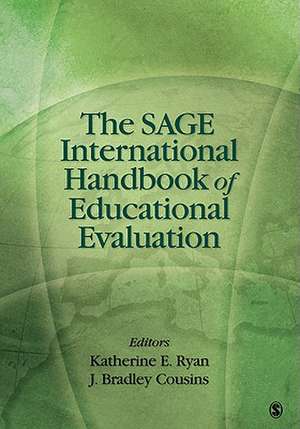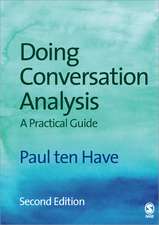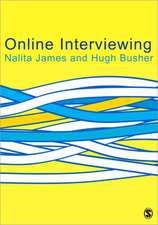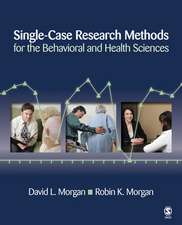The SAGE International Handbook of Educational Evaluation
Autor Katherine E. Ryan, J. Bradley Cousinsen Limba Engleză Hardback – 30 sep 2009
Preț: 1092.15 lei
Preț vechi: 1496.09 lei
-27% Nou
Puncte Express: 1638
Preț estimativ în valută:
208.100€ • 218.48$ • 176.61£
208.100€ • 218.48$ • 176.61£
Carte tipărită la comandă
Livrare economică 07-21 martie
Preluare comenzi: 021 569.72.76
Specificații
ISBN-13: 9781412940689
ISBN-10: 1412940680
Pagini: 608
Dimensiuni: 178 x 254 x 36 mm
Greutate: 1.23 kg
Ediția:1
Editura: SAGE Publications
Colecția Sage Publications, Inc
Locul publicării:Thousand Oaks, United States
ISBN-10: 1412940680
Pagini: 608
Dimensiuni: 178 x 254 x 36 mm
Greutate: 1.23 kg
Ediția:1
Editura: SAGE Publications
Colecția Sage Publications, Inc
Locul publicării:Thousand Oaks, United States
Cuprins
Introduction
Acknowledgments
PART I. THE EDUCATIONAL EVALUATION CONTEXT
1. Globalization and Policy Research in Education - Fazal Rizvi
2. Globalizing Influences on the Western Evaluation Imaginary - Thomas A. Schwandt
3. Fundamental Evaluation Issues in a Global Society - Nick L. Smith
PART II. THE ROLE OF SCIENCE IN EDUCATIONAL EVALUATION
4. Evaluation, Method Choices, and Pathways to Consequences: Trying to Making Sense of How Evaluation Can Contribute to Sensemaking
5. Randomized Experiments and Quasi-Experimental Designs in Educational Research - Peter M. Steiner, Angela Wroblewski & Thomas D. Cook
6. Enhancing Impact Evidence on How Global Education Initiatives Work: Theory, Epistemological Foundations, and Principles for Applying Multiphase, Mixed Method Designs
7. The Evaluation of the Georgia Pre-K Program: An Example of a Scientific Evaluation of an Early Education Program - Gary T. Henry & Dana K. Rickman
8. Globalization-Blessing and Bane in Empirical Evaluation: Lessons in Three Acts - Jacob Marszalek & Debra D. Bragg
9. Science-Based Educational Evaluation and Student Learning in a Global Society: A Critical Appraisal - Lois-ellin Datta
PART III. EDUCATIONAL EVALUATION, CAPACITY BUILDING, AND MONITORING
10. Evaluation, Accountability and Performance Measurement in National Education Systems: Trends, Methods, and Issues - Katherine E. Ryan
11. A Precarious Balance: Educational Evaluation Capacity Building in a Globalized Society
12. International Assessments and Indicators: How Will Assessments and Performance Indicators Improve Educational Policies and Practices in a Globalized Society?
13. Exemplary Case: Implementing Large-Scale Assessment of Education in Mexico
14. Inquiry-Minded District Leaders: Evaluation as Inquiry, Inquiry as Practice
15. Where Global Meets Local: Contexts, Constraints, and Consensus in School Evaluation in Ireland - Gerry McNamara & Joe O?Hara
16. Accountability and Capacity Building: Can They Live Together?
PART IV. EDUCATIONAL EVALUATION AS LEARNING AND DISCOVERY
17. Learning-Oriented Educational Evaluation in Contemporary Society
18. Meaningfully Engaging With Difference Through Mixed Methods Educational Evaluation
19. Case Study Methods in Educational Evaluation - Linda Mabry
20. Developing a Community of Practice: Learning and Transformation Through Evaluation
21. Learning-in-(Inter)action: A Dialogical Turn to Evaluation and Learning
22. Educational Evaluation as Mediated Mutual Learning - John Elliott
PART V. EDUCATIONAL EVALUATION IN A POLITICAL WORLD
23. Own Goals: Democracy, Evaluation, and Rights in Millennium Projects
24. Reclaiming Knowledge at the Margins: Culturally Responsive Evaluation in the Current Evaluation Moment
25. Evaluation for and by Navajos: A Narrative Case of the Irrelevance of Globalization - Stafford Hood
26. Dialogue, Deliberation and Democracy in Educational Evaluation: Theoretical Arguments and a Case Narrative
27. Pursuing the Wrong Indicators? The Development and Impact of Test-Based Accountability
PART VI. EDUCATIONAL EVALUATION: OPPORTUNITIES AND NEW DILEMMAS
28. Evaluation and Educational Policymaking
29. Technology and Educational Evaluation - Michael Scriven
30. Serving the Public Interest Through Educational Evaluation: Salvaging Democracy by Rejecting Neoliberalism
31. Dilemmas for Educational Evaluation in a Globalized Society - J. Bradley Cousins & Katherine Ryan
Author Index
Subject Index
About the Editors
About the Contributors
Acknowledgments
PART I. THE EDUCATIONAL EVALUATION CONTEXT
1. Globalization and Policy Research in Education - Fazal Rizvi
2. Globalizing Influences on the Western Evaluation Imaginary - Thomas A. Schwandt
3. Fundamental Evaluation Issues in a Global Society - Nick L. Smith
PART II. THE ROLE OF SCIENCE IN EDUCATIONAL EVALUATION
4. Evaluation, Method Choices, and Pathways to Consequences: Trying to Making Sense of How Evaluation Can Contribute to Sensemaking
5. Randomized Experiments and Quasi-Experimental Designs in Educational Research - Peter M. Steiner, Angela Wroblewski & Thomas D. Cook
6. Enhancing Impact Evidence on How Global Education Initiatives Work: Theory, Epistemological Foundations, and Principles for Applying Multiphase, Mixed Method Designs
7. The Evaluation of the Georgia Pre-K Program: An Example of a Scientific Evaluation of an Early Education Program - Gary T. Henry & Dana K. Rickman
8. Globalization-Blessing and Bane in Empirical Evaluation: Lessons in Three Acts - Jacob Marszalek & Debra D. Bragg
9. Science-Based Educational Evaluation and Student Learning in a Global Society: A Critical Appraisal - Lois-ellin Datta
PART III. EDUCATIONAL EVALUATION, CAPACITY BUILDING, AND MONITORING
10. Evaluation, Accountability and Performance Measurement in National Education Systems: Trends, Methods, and Issues - Katherine E. Ryan
11. A Precarious Balance: Educational Evaluation Capacity Building in a Globalized Society
12. International Assessments and Indicators: How Will Assessments and Performance Indicators Improve Educational Policies and Practices in a Globalized Society?
13. Exemplary Case: Implementing Large-Scale Assessment of Education in Mexico
14. Inquiry-Minded District Leaders: Evaluation as Inquiry, Inquiry as Practice
15. Where Global Meets Local: Contexts, Constraints, and Consensus in School Evaluation in Ireland - Gerry McNamara & Joe O?Hara
16. Accountability and Capacity Building: Can They Live Together?
PART IV. EDUCATIONAL EVALUATION AS LEARNING AND DISCOVERY
17. Learning-Oriented Educational Evaluation in Contemporary Society
18. Meaningfully Engaging With Difference Through Mixed Methods Educational Evaluation
19. Case Study Methods in Educational Evaluation - Linda Mabry
20. Developing a Community of Practice: Learning and Transformation Through Evaluation
21. Learning-in-(Inter)action: A Dialogical Turn to Evaluation and Learning
22. Educational Evaluation as Mediated Mutual Learning - John Elliott
PART V. EDUCATIONAL EVALUATION IN A POLITICAL WORLD
23. Own Goals: Democracy, Evaluation, and Rights in Millennium Projects
24. Reclaiming Knowledge at the Margins: Culturally Responsive Evaluation in the Current Evaluation Moment
25. Evaluation for and by Navajos: A Narrative Case of the Irrelevance of Globalization - Stafford Hood
26. Dialogue, Deliberation and Democracy in Educational Evaluation: Theoretical Arguments and a Case Narrative
27. Pursuing the Wrong Indicators? The Development and Impact of Test-Based Accountability
PART VI. EDUCATIONAL EVALUATION: OPPORTUNITIES AND NEW DILEMMAS
28. Evaluation and Educational Policymaking
29. Technology and Educational Evaluation - Michael Scriven
30. Serving the Public Interest Through Educational Evaluation: Salvaging Democracy by Rejecting Neoliberalism
31. Dilemmas for Educational Evaluation in a Globalized Society - J. Bradley Cousins & Katherine Ryan
Author Index
Subject Index
About the Editors
About the Contributors
Notă biografică
Katherine Ryan (B.S., Psychology, M.Ed., Special Education, Ph.D., Educational Psychology, University of Illinois - Urbana) is Associate Professor of Educational Psychology in the College of Education at UIUC. Her areas of specialization include Educational Measurement, Program Evaluation, and Applied Statistics, and she is currently Head of Measurement and Evaluation in the College of Education. Her research interests include assessment validation issues, particularly the evaluation of validity evidence based on response processes and consequences of assessments. Other interests include differential item/test functioning, and issues in program evaluation theory and practice. She teaches Descriptive and Inferential Statistics, Classroom Assessment, Introduction to Measurement, Introduction to Program Evaluation Theory, and Introduction to Evaluation Methods. She has edited two volumes of New Directions in Evaluation for the American Evaluation Association (AEA), one on evaluation as a democratic process, and the other on teaching evaluation in higher education.
Descriere
The Handbook of Educational Evaluation brings together the experience of top evaluation leaders around the world to present and discuss the core methods and applications of educational evaluation.








